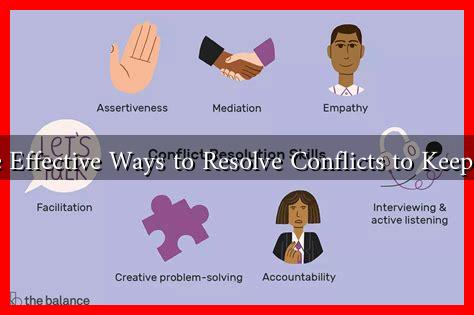-
Table of Contents
What are Effective Ways to Resolve Conflicts to Keep Passion?
Conflict is an inevitable part of any relationship, whether personal or professional. However, how we handle these conflicts can significantly impact the passion and connection we share with others. Effective conflict resolution not only helps in maintaining relationships but also fosters a deeper understanding and respect among individuals. In this article, we will explore various strategies to resolve conflicts while keeping the passion alive.
Understanding the Nature of Conflict
Before diving into conflict resolution strategies, it’s essential to understand the nature of conflict itself. Conflicts often arise from:
- Differences in values: Personal beliefs and values can clash, leading to misunderstandings.
- Miscommunication: Poor communication can escalate minor disagreements into significant conflicts.
- Emotional triggers: Past experiences can influence how individuals react to certain situations.
Recognizing these underlying causes can help in addressing conflicts more effectively.
Effective Conflict Resolution Strategies
1. Open Communication
One of the most effective ways to resolve conflicts is through open and honest communication. This involves:
- Listening actively to the other person’s perspective.
- Expressing your feelings without blaming or attacking.
- Asking clarifying questions to ensure understanding.
For example, in a workplace setting, if two team members disagree on a project approach, they should sit down and discuss their viewpoints openly. This can lead to a collaborative solution that incorporates both perspectives.
2. Finding Common Ground
Identifying shared interests or goals can help in resolving conflicts. When both parties focus on what they have in common, it becomes easier to navigate disagreements. Consider the following steps:
- Identify mutual goals.
- Discuss how each party’s needs can be met.
- Work together to create a solution that benefits everyone.
A case study from the Harvard Negotiation Project illustrates this point. In negotiations between labor unions and management, focusing on shared goals often led to successful agreements that satisfied both parties.
3. Emphasizing Empathy
Empathy plays a crucial role in conflict resolution. By putting yourself in the other person’s shoes, you can better understand their feelings and motivations. This can be achieved by:
- Validating the other person’s feelings.
- Expressing understanding of their perspective.
- Being patient and allowing them to express themselves fully.
Research shows that empathetic communication can reduce hostility and promote cooperation, making it a powerful tool in conflict resolution.
4. Setting Boundaries
While resolving conflicts, it’s essential to establish clear boundaries. This helps in maintaining respect and preventing future conflicts. Consider these tips:
- Clearly define acceptable behaviors.
- Communicate your limits respectfully.
- Be consistent in enforcing boundaries.
For instance, in a romantic relationship, discussing and agreeing on boundaries regarding personal space and communication can prevent misunderstandings and foster a healthier connection.
Statistics and Insights
According to a study by the American Psychological Association, effective conflict resolution can lead to improved relationships and increased satisfaction. The study found that couples who engage in constructive conflict resolution techniques report higher levels of intimacy and passion in their relationships.
Conclusion
Conflict is a natural part of any relationship, but how we handle it can either strengthen or weaken our connections. By employing effective strategies such as open communication, finding common ground, emphasizing empathy, and setting boundaries, we can resolve conflicts while keeping the passion alive. Remember, the goal is not to win the argument but to foster understanding and connection. For more insights on conflict resolution, you can visit APA Communication.
In summary, embracing conflict as an opportunity for growth rather than a setback can lead to more profound relationships and a more passionate connection with others.

